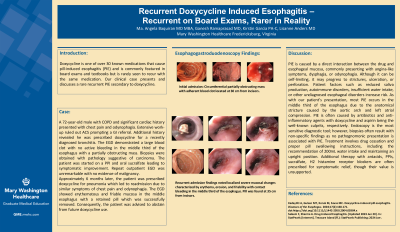Monday Poster Session
Category: Esophagus
P2279 - Recurrent Doxycycline Induced Esophagitis – Recurrent on Board Exams, Rarer in Reality
Monday, October 28, 2024
10:30 AM - 4:00 PM ET
Location: Exhibit Hall E

Has Audio

Ma. Angela Baquiran, MD, MBA
Mary Washington Healthcare, VA
Presenting Author(s)
Ma. Angela Baquiran, MD, MBA1, Ganesh Ramaprasad, MS, MD2, Kirstin Garcia, PA-C3, Lisanne Anders, MD3
1Mary Washington Healthcare, Alexandria, VA; 2Mary Washington Healthcare, Frederickburg, VA; 3Mary Washington Healthcare, Fredericksburg, VA
Introduction: Doxycycline is one of over 30 known medications that can cause pill-induced esophagitis (PIE) and is commonly featured in board exam questions and textbooks but is rarely seen to recur with the same medication. Our clinical case presents and discusses a rare recurrent PIE secondary to doxycycline.
Case Description/Methods: A 72-year-old male with COPD and significant cardiac history presented with chest pain and odynophagia. Extensive work-up ruled out ACS prompting a GI referral. Additional history revealed he was prescribed doxycycline for a recently diagnosed bronchitis. The EGD demonstrated a large blood clot with no active bleeding in the middle third of the esophagus with a partially obstructing mass. Biopsies were obtained with pathology suggestive of carcinoma. The patient was started on a PPI and oral sucralfate leading to symptomatic improvement. Repeat outpatient EGD was unremarkable with no evidence of malignancy.
Approximately 6 months later, the patient was prescribed doxycycline for pneumonia which led to readmission due to similar symptoms of chest pain and odynophagia. The EGD showed erythematous and friable mucosa in the middle esophagus with a retained pill which was successfully removed. Consequently, the patient was advised to abstain from future doxycycline use.
Discussion: PIE is caused by a direct interaction between the drug and esophageal mucosa, commonly presenting with angina-like symptoms, dysphagia, or odynophagia. Although it can be self-limiting, it may progress to strictures, ulceration, or perforation. Patient factors such as reduced saliva production, autoimmune disorders, insufficient water intake, or other undiagnosed esophageal disorders increase risk. As with our patient’s presentation, most PIE occurs in the middle third of the esophagus due to the anatomical stricture caused by the aortic arch and left atrial compression. PIE is often caused by antibiotics and anti-inflammatory agents with doxycycline and aspirin being the well-known culprits respectively. Endoscopy is the most sensitive diagnostic tool; however, biopsies often result with non-specific findings as no pathognomonic presentation is associated with PIE. Treatment involves drug cessation and proper pill swallowing instructions, including the recommendation of 200mL water intake and maintaining an upright position. Additional therapy with antacids, PPIs, sucralfate, H2 histamine receptor blockers are often prescribed for symptomatic relief, though their value is unsupported.
Disclosures:
Ma. Angela Baquiran, MD, MBA1, Ganesh Ramaprasad, MS, MD2, Kirstin Garcia, PA-C3, Lisanne Anders, MD3. P2279 - Recurrent Doxycycline Induced Esophagitis – Recurrent on Board Exams, Rarer in Reality, ACG 2024 Annual Scientific Meeting Abstracts. Philadelphia, PA: American College of Gastroenterology.
1Mary Washington Healthcare, Alexandria, VA; 2Mary Washington Healthcare, Frederickburg, VA; 3Mary Washington Healthcare, Fredericksburg, VA
Introduction: Doxycycline is one of over 30 known medications that can cause pill-induced esophagitis (PIE) and is commonly featured in board exam questions and textbooks but is rarely seen to recur with the same medication. Our clinical case presents and discusses a rare recurrent PIE secondary to doxycycline.
Case Description/Methods: A 72-year-old male with COPD and significant cardiac history presented with chest pain and odynophagia. Extensive work-up ruled out ACS prompting a GI referral. Additional history revealed he was prescribed doxycycline for a recently diagnosed bronchitis. The EGD demonstrated a large blood clot with no active bleeding in the middle third of the esophagus with a partially obstructing mass. Biopsies were obtained with pathology suggestive of carcinoma. The patient was started on a PPI and oral sucralfate leading to symptomatic improvement. Repeat outpatient EGD was unremarkable with no evidence of malignancy.
Approximately 6 months later, the patient was prescribed doxycycline for pneumonia which led to readmission due to similar symptoms of chest pain and odynophagia. The EGD showed erythematous and friable mucosa in the middle esophagus with a retained pill which was successfully removed. Consequently, the patient was advised to abstain from future doxycycline use.
Discussion: PIE is caused by a direct interaction between the drug and esophageal mucosa, commonly presenting with angina-like symptoms, dysphagia, or odynophagia. Although it can be self-limiting, it may progress to strictures, ulceration, or perforation. Patient factors such as reduced saliva production, autoimmune disorders, insufficient water intake, or other undiagnosed esophageal disorders increase risk. As with our patient’s presentation, most PIE occurs in the middle third of the esophagus due to the anatomical stricture caused by the aortic arch and left atrial compression. PIE is often caused by antibiotics and anti-inflammatory agents with doxycycline and aspirin being the well-known culprits respectively. Endoscopy is the most sensitive diagnostic tool; however, biopsies often result with non-specific findings as no pathognomonic presentation is associated with PIE. Treatment involves drug cessation and proper pill swallowing instructions, including the recommendation of 200mL water intake and maintaining an upright position. Additional therapy with antacids, PPIs, sucralfate, H2 histamine receptor blockers are often prescribed for symptomatic relief, though their value is unsupported.
Disclosures:
Ma. Angela Baquiran indicated no relevant financial relationships.
Ganesh Ramaprasad indicated no relevant financial relationships.
Kirstin Garcia indicated no relevant financial relationships.
Lisanne Anders indicated no relevant financial relationships.
Ma. Angela Baquiran, MD, MBA1, Ganesh Ramaprasad, MS, MD2, Kirstin Garcia, PA-C3, Lisanne Anders, MD3. P2279 - Recurrent Doxycycline Induced Esophagitis – Recurrent on Board Exams, Rarer in Reality, ACG 2024 Annual Scientific Meeting Abstracts. Philadelphia, PA: American College of Gastroenterology.
